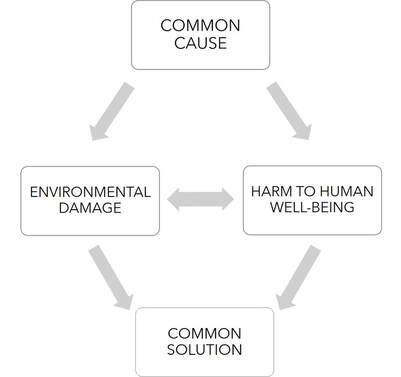How much does Human Welfare depend on Nature? | Part 4: Prioritising Planetary Health

Today many health policy analyses recognise the health issues occurring in response to climate change, such as the spread of tropical diseases and human migration due to the detrimental effect on resources. Health organisations seek to develop healthcare systems to cope with increasing demands that will emanate due to worsening climate change. However, as we have seen in the last three posts, there are many man-made issues that are causing both serious human health and environmental issues simultaneously and thus contributing to climate change. Nature has an abundance of complex mechanisms to deal with any challenge from pest control to natural disasters, but human manipulation of these systems has had a detrimental effect on our environment and is having a knock-on effect on us and threatening humanity’s future. We have already learnt so much from nature from discovering medicines to building aircraft inspired by the aerodynamics of bird flight. We must continue to learn from nature to find solutions for our planet’s future.
Markers of human success, particularly among politicians, are economic and business growth, increasing human population and life expectancy, with no regard for the environment ort the welfare of disadvantaged populations, particularly in developing countries. But these markers are eroding our natural resources and are no longer sustainable. We need to alter our priorities and integrate planetary health into policymaking by putting the environment at the heart of all new policies, particularly health policy, but also regarding other policy areas that affect the environment such as manufacturing, agriculture and transport.
The way medicine is taught, practiced and researched needs to change. Today biological research is heavily focused on establishing the molecular mechanisms of disease and biological processes with the aim of publishing in ‘high-impact’ journals and securing research funding, often at the expense of eliminating the causes of disease or finding a treatment. Biological and medical research must take a more holistic approach to understanding disease processes by establishing:
- the disease’s impact on the entire body rather than a specific cell or organ of interest.
- the environmental and social factors that could be the root cause or responsible for stimulating a signalling pathway or transcription factor.
- a preventative approach by examining the environmental and social impact of potential treatments for existing patients.
The notion of inter-disciplinary research that is more recently referred to as convergence science, must go beyond the current model of bringing together scientists from different disciplines to find cures, and look for multiple options for treatment and prevention. Medical teaching must include examination of environmental and behavioural causes of disease as part of diagnosis. Scientific journals must reduce the emphasis on establishing the molecular mechanisms of disease and instead seek to understand possible environmental triggers and preventative measures.
Policies must recognise causes common to both environmental and human health problems, and the need for solutions that will alleviate both problems, without solving one problem at the expense of the other. The solutions can include new health and environmental policies, sustainable living practices, technological development and encourage the concept of the circular economy.

The key policies that must be prioritised, many of which already proposed by conservation and environmental organisations are:
- Enforce measure to make all countries and sectors carbon net zero by 2030 at the latest, phase out fossil fuels and producers of toxic pollutants, develop renewable technology and carbon-neutral transport.
- Introduce carbon taxes on emissions. Pass Environmental laws overseen by an independent watchdog to prioritise healthy air, clean water, thriving wildlife, green spaces where people live and eliminating waste and plastic pollution.
- Rule out signing trade deals with countries that are not implementing the Paris Agreement or upholding human rights and environmental standards.
- Strengthen regulation on the addition of sugar and salt by the food industry, particularly to processed foods. Also improve public and school education on diet.
- Phase out the use of antibiotics in farming, develop alternative means of meat production.
- Improve wastewater filtration and treatment to remove residual medicinal and chemical products.
- Phase out the production and use of tobacco cigarettes while investigating and regulating the use of e-cigarettes.
- Outlaw and strictly enforce the law against the clearance of forest by loggers, farmers and developers.
- Introduce pesticide taxes and use the funds to help farmers reduce pesticide use. Also phase out the sale of pesticides at garden centres, make towns and cities pesticide free.
- Invest in measures to cut food waste and enforce the recycling of food packaging by manufacturers, not local councils.
- Invest in measures to help the fashion industry recycle old materials, use carbon-neutral methods of manufacture and uphold human rights.
- Enhance the number of green spaces on unused land, re-wild cities and urban spaces with a view to enhancing biodiversity.
- Setup educational programs to educate professionals on policymaking for integrative planetary and human health, scientific research to develop technology improving quality of life, and solving environmental and human health problems in a sustainable manner.
- Include exposure to nature in health advice and prescriptions to treat health conditions such as mental health issues, hypertension and diabetes, and to aid social cohesion among local communities.
- Encourage countries and industries to move towards a ‘circular’ economics model, where materials and products are recycled, waste and pollution is eliminated [1].
Changing mindsets - nature can survive without us, but we cannot survive without nature
While the last three posts have looked at many causes of human and planetary health issues, there are numerous issues that I have not been able to explore in detail but are just as important to tackle such as: poaching, wildlife crime, ocean acidification, household pollution, freshwater use, fertiliser use in farming, water usage, flood management, biofuels, harm to wildlife caused by domestic pets, the illicit drug trade, overfishing, whaling, bird trapping, the pet trade, increasing infectious diseases, and the fashion industry. Clearly there are many areas that need urgent attention and may require a drastic change to the way we live, but if life is to survive on our planet, it is essential.
I hope over the past few blog posts, you have seen how almost every facet of our lives has an effect on the environment and conversely the natural world affects every part of our lives too. Our greed for wealth, materials and food has left our planet in turmoil. We are consuming more resources than our planet can produce every year, and the rate of consumption is increasing year on year. I often find parallels in the way modern humans exploit nature with what Buddhist meditation aims to eliminate, a philosophy I came to learn as I was growing up. A brilliant article by the late Professor Lily De Silva for the Buddhist Publication Society, describes how humans have become more materialistic since the industrial revolution, hence alienating themselves from and exploiting nature. Thus, the moral degeneration of man leads to diminished mental and physical health and the depletion of natural resources [2]. With the launch of Girawa, and our existing collaboration with the Foundation of Goodness, we hope to inspire the understanding necessary to make meaningful change.
Consumerism is killing our planet, and killing humanity in the process, it cannot go on any longer. It’s time humans learn to live in harmony with the very ecosystems that sustain our survival. Not only must we push for a halt to carbon emissions as a matter of urgency, we must re-wild and restore nature to as close to the state as it once was. We must stop treating our natural world as a commodity and mere obstacle and give it the respect it deserves for all that it gives to sustain our lives. To use an analogy from Buddhism, “we should utilise nature just like a bee taking nectar from a flower, neither polluting its beauty nor depleting its fragrance. Just as the bee manufactures honey out of pollen, so man should be able to find happiness and fulfilment in life without harming the natural world in which he lives.” To destroy nature is to destroy the basis of life on Earth and the foundation of our own lives. We have seen at sites like Chernobyl that when humanity is driven out, nature thrives. Nature and our planet can survive without us, in fact it’s probably better off without us in most places. But humanity cannot survive without nature, and it’s time we acknowledged that and treated it as such.
References
[1] European Commission. Towards a circular economy: a zero-waste programme for Europe. 2014. http://eur-lex.europa.eu/legal-content/EN/TXT/?uri=CELEX:52014DC0398 (accessed Dec 22, 2014)) https://ec.europa.eu/environment/circular-economy/pdf/circular-economy-communication.pdf
[2] https://accesstoinsight.org/lib/authors/desilva/attitude.html
